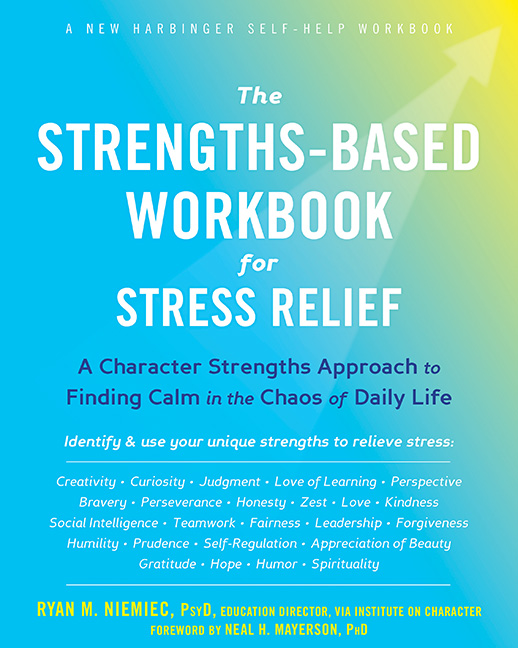By Ryan M. Niemiec, PsyD, author of The Strengths-Based Workbook for Stress Relief
Would you believe that a Google search on “stress management” brings up 27.5 million hits?
There are so many ways to talk about stress and how to manage it but an area that gets almost no attention, in fact so little that we could call it a “secret,” is one of the most impactful and positive tools—and it’s free.
I’m referring to the use of your very best qualities you have as a human being: your character strengths.
Modern research discovered something groundbreaking in the early 2000s. After studying classic and modern texts on virtues, ethics, and the good life; and conducting field research and testing with human beings across the planet—from the most remote cultures to Western and Eastern cultures—a discovery was made. We have at least twenty-four character strengths within us. These are twenty-four positive qualities such as fairness, gratitude, perseverance, zest, and hope, which are part of our identity that, when used, can help us in many ways.
Research show we can turn to these character strengths not only to build well-being, meaning in life, better relationships, and more accomplishments, but they help us to manage stress and challenging experiences like depression, anxiety, and relationship conflict.
We all need stress management tools. There are few of us out there who cannot benefit from building up our capacity to handle pressures in life or building up our personal resources. It all starts with knowing not only the twenty-four character strengths that are part of this “language of strength and positivity,” but it involves you knowing what your best strengths are. What are your highest five strengths—often called your signature strengths?
Among my signature character strengths are love, curiosity, and appreciation of beauty. I’ve come to realize I use these strengths every day in my work, with my family, and when I’m alone. When I’m upset, I turn to savoring the beauty outside my home, soaking in the trees and the sounds of my pond. When there’s a relationship conflict at work, I have my curiosity strength I can rely on where I can ask questions and spend time exploring and being curious about our disagreement. And at home, I know my love strength is there to share as I show warmth and individualized attention to each of my kids.
Don’t know your best strengths? No problem. Take the only free, scientifically valid test of character strengths online. This measure, taken by over eight million people, is called the VIA Survey. You receive immediate results of your strengths from highest to lowest. Any of the twenty-four can be part of your stress-busting repertoire!
Because your character strengths help you view stress in a new way, you can readily find benefits in working on your strengths, and even more important, you can take action to strategize differently with stress. Let’s take a look at three activities to help you take action today. We’ll tackle a stressor in your past, in the present, and in the future so you can begin using your strengths in a thorough way.
1. Stress in the past:
- Name one stressor, life challenge, or conflict that you successfully resolved. This might be something from last week or five years ago. It might be when you recovered from breast cancer, overcame a relationship breakup, or got through a very tense week at work.
- As you think about what you overcame, consider this: Which of your character strengths (any of the twenty-four) helped you overcome or resolve the issue? By definition, you’d have had to use a couple or several strengths, so name at least two. Was it perseverance to overcome the adversity? Creativity to come up with new ways to handle the problem? Fairness to reach a compromise?
2. Stress in the present: One of the most powerful benefits of mindfulness is that it brings us to face our present moment, regardless of whether the moment is pleasant, unpleasant, or neutral. But which character strengths are you actually using to do that? How might you use your strengths to face and embrace your present moment? Might you turn to bravery to muster the courage to handle a stressor you’ve been avoiding? Perhaps you need to use self-regulation to repeatedly bring your focus back to the stressor at hand so you can find new ways to handle it?
3. Stress in the future: When you know you’ll be soon facing a difficult conversation with your boss or with your child, or you know that you have to give an anxiety-provoking presentation or you know you’ll be worried about what you doctor has to say at your next health care checkup, prepare with your strengths! There’s a strategy called resource priming which has shown great benefits for therapists working with clients, and you can use it too. What I invite you to do is to think about your signature strengths for a few minutes before the event. Remind yourself of each of your top strengths, some of the specific ways you’ve used them in your life, and how you might bring them forth to handle your upcoming challenge. In other words, prime yourself with your best qualities!
These are a few of the strategies I discuss in my new book, The Strengths-Based Workbook for Stress Relief check-up the first stress workbook to deliberately target your character strengths. This book will help you see the positive side of stress, discover empowering ways to improve your stress management, and learn specific tools to handle your stress in relationships, health, and work.
Reference:
Niemiec, R. M. (2019). The strengths-based workbook for stress relief. Oakland, CA: New Harbinger.
Ryan M. Niemiec, PsyD, is a leading figure in the education, research, and practice of character strengths that are found in all human beings. Ryan is education director of the VIA Institute on Character, a global nonprofit organization in Cincinnati, OH, that advances the latest science and practical applications of character strengths. He is an award-winning psychologist, and author and coauthor of several books, including The Strengths-Based Workbook for Stress Relief, The Power of Character Strengths, Character Strengths Interventions, and Mindfulness and Character Strengths.



 2024 Peace Playbook: 3 Tactics to Avoid Clashes with Your Partner
2024 Peace Playbook: 3 Tactics to Avoid Clashes with Your Partner